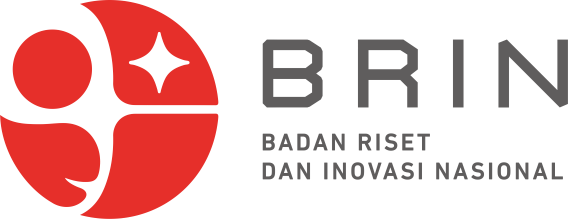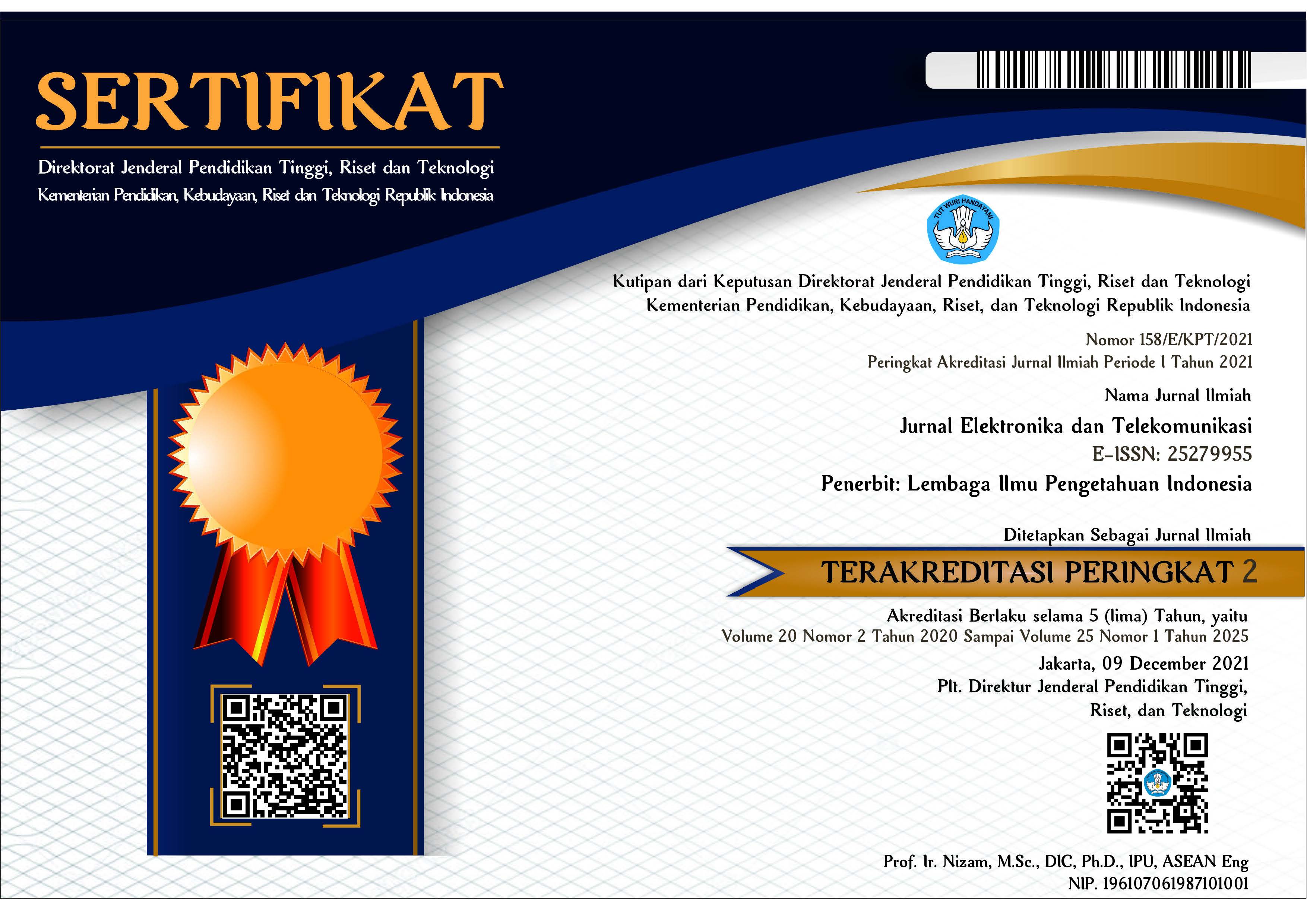Publication Ethics and Malpractice Statement
Jurnal Elektronika dan Telekomunikasi is a peer-reviewed open-access journal. This statement clarifies ethical behavior of all parties involved in the act of publishing an article in this journal, including the author, the Editor in Chief, the Editorial Board, the peer-reviewers and the publisher (Research Center for Electronics and Telecommunication, Indonesian Institute of Sciences ). This statement is based on COPE’s Best Practice Guidelines for Journal Editors.
After you have finished reading this Publication Ethics and Malpractice Statement, please download the Ethical Statement and the Copyright Agreement. Please sign and submit the Ethical Statement as a part of your initial article submission. The Copyright Agreement must be submitted before the article can be published
Ethical Guideline for Journal Publication
The publication of an article in a peer-reviewed JET journal is an essential building block in the development of a coherent and respected network of knowledge. It is a direct reflection of the quality of the work of the authors and the institutions that support them. Peer-reviewed articles support and embody the scientific method. It is therefore important to agree upon standards of expected ethical behavior for all parties involved in the act of publishing: the author, the journal editor, the reviewer, the publisher and the society.
Research Center for Electronics and Telecommunication, Indonesian Institute of Sciences as publisher of JET journal takes its duties of guardianship over all stages of publishing extremely seriously and we recognize our ethical and other responsibilities. We are committed to ensuring that advertising, reprint or other commercial revenue has no impact or influence on editorial decisions. In addition, Research Center for Electronics and Telecommunication, Indonesian Institute of Sciences and Editorial Board will assist in communications with other journals and/or publishers where this is useful and necessary.
Policy on Prior Publication
JET does not view the following forms of prior publication as duplicate or redundant publication:
- Abstracts and posters presented as part of conference proceedings.
- Results presented at meetings (for example, to inform investigators or participants about findings).
- Results in databases and clinical trials registries (data without interpretation, discussion, context or conclusions in the form of tables and text to describe data/information).
- Dissertations and theses in university archives.
However, it is mandatory that authors submitting articles must disclose whether there are prior publications (in the above forms) by the authors that are similar, whether published or submitted. Such information should be declared in the Ethical Statement and submitted during the submission.
In case of any doubt, authors should seek advice from the editor handling their contribution.
Duties of Editor
- Publication Decisions: The editor of the JET journal is responsible for deciding which of the articles submitted to the journal should be published. The validation of the work in question and its importance to researchers and readers must always drive such decisions. The editors may be guided by the policies of the journal's Editorial Board and constrained by such legal requirements as shall then be in force regarding libel, copyright infringement and plagiarism. The editors may confer with other editors or reviewers in making this decision.
- Review of Manuscripts: Editor must ensure that each manuscript is initially evaluated by the editor for originality. The editor should organize and use peer review fairly and wisely. Editors should explain their peer review processes in the information for authors and also indicate which parts of the journal are peer reviewed. Editor should use appropriate peer reviewers for papers that are considered for publication by selecting people with sufficient expertise and avoiding those with conflicts of interest. Complete Review Policy can be found here.
- Fair Play: An editor at any time evaluate manuscripts for their intellectual content without regard to race, gender, sexual orientation, religious belief, ethnic origin, citizenship, or political philosophy of the authors.
- Confidentiality: The editor and any editorial staff must not disclose any information about a submitted manuscript to anyone other than the corresponding author, reviewers, potential reviewers, other editorial advisers, and the publisher, as appropriate.
- Disclosure and Conflicts of Interest: The editor of the Journal will not use unpublished materials disclosed in a submitted manuscript for his own research without written consent of the author. Editors should not be involved in decisions about papers in which they have a conflict of interest
Duties of Reviewers
- Contribution to Editorial Decisions: Peer review assists the editor in making editorial decisions and through the editorial communications with the author may also assist the author in improving the paper.
- Promptness: Any selected referee who feels unqualified to review the research reported in a manuscript or knows that its prompt review will be impossible should notify the editor and excuse himself from the review process.
- Confidentiality: Any manuscripts received for review must be treated as confidential documents. They must not be shown to or discussed with others except as authorized by the editor.
- Standards of Objectivity: Reviews should be conducted objectively. Personal criticism of the author is inappropriate. Referees should express their views clearly with supporting arguments.
- Acknowledgement of Sources: Reviewers should identify relevant published work that has not been cited by the authors. Any statement that an observation, derivation, or argument had been previously reported should be accompanied by the relevant citation. A reviewer should also call to the editor's attention any substantial similarity or overlap between the manuscript under consideration and any other published paper of which they have personal knowledge.
- Disclosure and Conflict of Interest: Privileged information or ideas obtained through peer review must be kept confidential and not used for personal advantage. Reviewers should not consider manuscripts in which they have conflicts of interest resulting from competitive, collaborative, or other relationships or connections with any of the authors, companies, or institutions connected to the papers.
Duties of Authors
- Reporting Standards: Authors of reports of original research should present an accurate account of the work performed as well as an objective discussion of its significance. Underlying data should be represented accurately in the paper. A paper should contain sufficient detail and references to permit others to replicate the work. Fraudulent or knowingly inaccurate statements constitute unethical behavior and are unacceptable.
- Data Access and Retention: Authors are asked to provide the raw data in connection with a paper for editorial review, and should be prepared to provide public access to such data (consistent with the ALPSP-STM Statement on Data and Databases), if practicable, and should in any event be prepared to retain such data for a reasonable time after publication.
- Originality and Plagiarism: The authors should ensure that they have written entirely original works, and if the authors have used the work and/or words of others that this has been appropriately cited or quoted.
- Multiple, Redundant or Concurrent Publication: An author should not in general publish manuscripts describing essentially the same research in more than one journal or primary publication. Submitting the same manuscript to more than one journal concurrently constitutes unethical publishing behavior and is unacceptable.
- Acknowledgement of Sources: Proper acknowledgment of the work of others must always be given. Authors should cite publications that have been influential in determining the nature of the reported work.
- Authorship of the Paper: Authorship should be limited to those who have made a significant contribution to the conception, design, execution, or interpretation of the reported study. All those who have made significant contributions should be listed as co-authors. Where there are others who have participated in certain substantive aspects of the research project, they should be acknowledged or listed as contributors. The corresponding author should ensure that all appropriate co-authors and no inappropriate co-authors are included on the paper, and that all co-authors have seen and approved the final version of the paper and have agreed to its submission for publication.
- Disclosure and Conflicts of Interest: All authors should disclose in their manuscript any financial or other substantive conflict of interest that might be construed to influence the results or interpretation of their manuscript. All sources of financial support for the project should be disclosed.
- Fundamental Errors in Published Works: When an author discovers a significant error or inaccuracy in his/her own published work, it is the author's obligation to promptly notify the journal editor or publisher and cooperate with the editor to retract or correct the paper.
Intellectual Property (Copyright Policy)
JET policy about intelectual property or copyright is declared here.
Peer-Review Process Policy
Reviewing process will consider novelty, objectivity, method, scientific impact, conclusion, and references. Reviewers' comments will be sent to the corresponding author for necessary actions and responses. Editorial Board will evaluate the reviewer’s comment and then send the final decision regarding the submission to the corresponding author based on reviewer’s recommendation. Peer-Review process/policy is declared here.
Plagiarism Screening Policy
JET will immediately investigate and reject papers leading to plagiarism or self-plagiarism. JET Editorial Board will ensure that every published article will not exceed 30% similarity Score. Plagiarism screening policy is decribed here.
Post-Publication Discussions and Corrections
JET accepts discussion and corrections on published articles by reader. In case the reader giving discussions and corrections toward a published article, the reader can contact by email to Editor in Chief by explaining the discussions and corrections. If accepted (by Editor in Chief), the discussions and correction will be published in next issue as Letter to Editor. Respected Authors can reply/answer the discussions and corrections from the reader by sending the reply to Editor in Chief. Therefore, Editors may publish the answer as Reply to Letter to Editor.
Article Withdrawal Policy
Standards for dealing with article widrawal, article retraction, article remocal, and article replacement on JET Policy can be found here.























